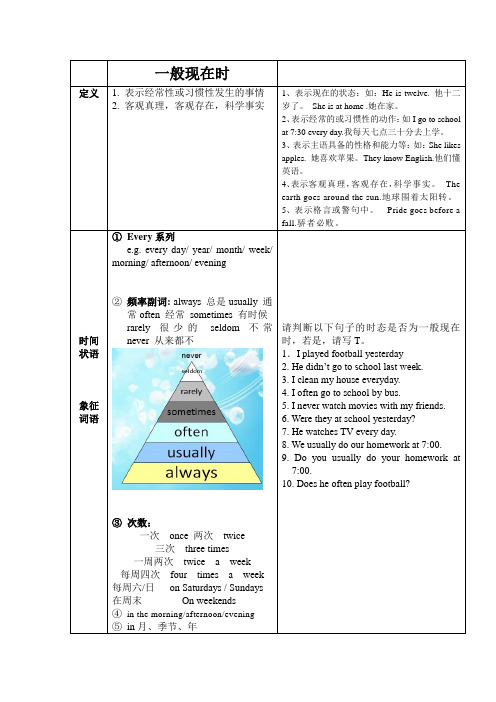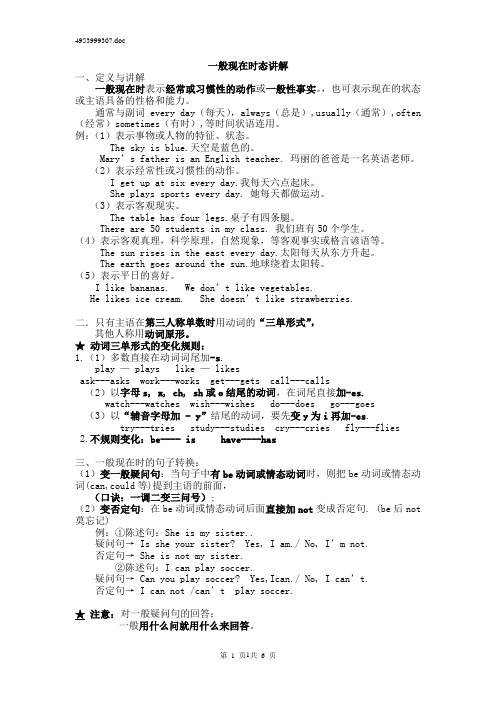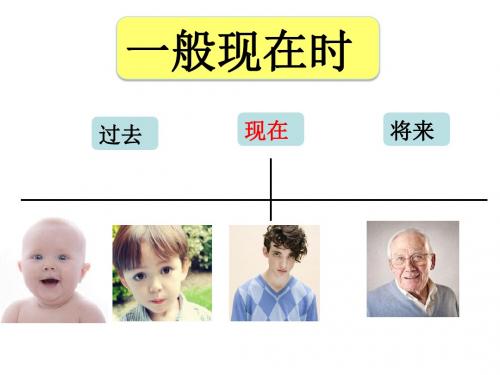一般现在时(精讲)
一般现在时精讲

③次数:一次once 两次twice①系动词be三变化,am , is , 还有are ,【一般现在时中,be动词只有am , is , 和are 三种形式。
】②I接am,you 接are,is连接他/她/它,【I和am连用,you和are连用he/she/it 和is 连用。
】③单数后面用is,复数后面都用are,【这里的单数主要指this/that/Tom/mymother/China等,复数主要指we/they/these/those/my parents等。
】④变疑问,be提前,句尾问号写周全,【肯定句变成一般疑问句时,把be提到句首,句尾的句号变问号就行。
】⑤变否定,真容易,be 和not是标记,【肯定句变成否定句时,只需把not放到be动词之后就行了。
】⑥应用时,要注意,缩略形式记心里,【be动词和很多词能构成缩写形式,这一点是需要记住的。
】⑦be词虽小作用大,初学英语全靠它。
【虽然be动词在一般现在时里只有三种形式,但它是学好英语的基础练习11、【用be的适当形式填空】I Tom .What your name ? My name’s Bob.you Mary? Yes, I am .His books in the bookcase .She my sister .these his books ? Yes ,they are .He my brother .It an orange .This my friend .that your brother ? yes , it is .Those my brothers .We good friends .★Tom and I friends .My watch on the desk .Her parents from Japan .2、【句型转换】①That is his dictionary .(改为一般疑问句)his dictionary ?②This is my ruler . (改为否定句)This my ruler .3. 基础练习肯定形式否定形式练习21.My father_______(listen) to the radio every day.2.Mike_______ (study) in a middle school.3.She______(take) Eddie for a walk after supper.4.He_______(wash) clothes with his hands.5.Simon ______ (pass) the ball to Daniel.6.Miss Li_______ (teach) Chinese.7.Look at the animal, it ____ four legs.练习31.My mother ____(work) in a primary school and I ____ (study) in the same school.2.I ____ (have) a bike and Ben ____ (have) a bike, too.3. My sister ____ (be) a pupil. She ____ (study) very hard.4. Who ___ (cook) breakfast for your family?5. My father is a teacher. He ____ (teach) Chinese in a primary school.6. He ____ (be) strong. He can ___ (carry) the heavy box.7. John ____ (go) to school by bike every day.8. Kate often ___ (play) table tennis with her friends.9. My mother often ___ (go) shopping and ___ (buy) some vegetbales in the market.10. --- Who ____ (study) hardest in your class?练习41. ____Alice often play the piano. No, she _____.A. Do; doB. Does; doesC. Does; doesn’t2. ___ your penfriend __ in Beijing?A. Do; liveB. Do; livesC. Does; live3. Tom and Mike __ very excited, they will take a trip.A. isB. areC. am4. I like ________ very much. What about you?A. danceB. dancedC. dancing5. I can’t find my pen. Let me __.A. go and ask herB. go and ask hersC. go and ask she6. Fangfang is a good student. She ____maths.A. does good atB. well do itC. is good at7. The kite ____ a bird.A. look likeB. is lookingC. looks like8. Bill and I ___ good friends.A. isB. areC. am9. Sandy often ___ his homework on Sundays .A. doB. doesC. did10. What do you usually do on the weekend? I __________.A. went swimmingB. go swimmingC. visited grandparents过关检测一.用动词的适当形式填空。
一般现在时

5、其他实义动词的一般现在时的陈述句、一般疑问句和特
殊疑问句。动词受到人称和数的变化而变化。 (1)陈述句:动词遇到三单(第三人称单数,以下称三单) 加s.其它用原形。例: He watches TV every day. They watch TV every day. (2)一般疑问句:直接在句首加助动词。三单加does,其它加do. 后面的动词要用回原形。 He watches TV every day.——Does he watch TV every day? They watch TV every day.——Do they watch TV every day? (3)特殊疑问句:疑问词+一般疑问句的形式。要注意动词要用 原形。 He watches TV every day .(根据划线部分提问)
3、 be动词的特殊疑问句: 疑问词+一般疑问句的形式。疑问词有 who,whom,what,where,why,which,when和how
His friend is from USA.(就划线部分提问) Where is his friend from? 疑问词 一般疑问句的形式
4、情态动词常见的有 can (could), may (might), must, need, ought to, dare (dared), shall (should), will (would) ,have(had),括号中的 是过去式。 情态动词没有人称和数的变化,后面的动词要用原形。 (1)陈述句 He can swim. I can help you. (2)一般疑问句:把情态动词放句首。 He can swim.——Can he swim? I can help you. ——Can I help you? (3)特殊疑问句:疑问词+一般疑问句的形式 He can swim.(根据划线部分提问) What can he do?(注意如果划线部分有谓语动词的,要加上 一个do)
一般现在时和一般过去时精讲+练习题

一、一般现在时(一)概念:表示经常性或习惯性的动作,或存在的状态1、肯定句:主语+谓语+其他。
She reads English everyday .2、否定句:主语+don’t/doesn’t+谓语+其他。
He doesn’t get up at 6:30 in the morning .3、一般疑问句:Do/Does+主语+V原+其他?Do you like English ? Yes, I do. /No, I don’t .4、特殊疑问句:特殊疑问词+do/does+主语+V原+其他?What time do you get up every morning ?Where does your father work ?(四)具体用法1、表示经常性或习惯性的动作,或存在的状态,常与表示频率的时间状语如:often , sometimes , usually,always , seldom,never, every day /year/month...), once/twice a week (month , year , etc.) , on Sundays等连用。
I leave home for school at seven every morning .2、在以when,if, as soon as, as long as等连词引导的从句中,当主句的谓语动词是一般将来时,那么从句的谓语动词通常用一般现在时来表示将来要发生的动作。
(主将从现)I'll tell him the news when he comes back. 他回来时,我将告诉他这个消息。
If you come this afternoon,we’ll have a meeting.今天下午如果你来,我们就开个会。
3、描述事物的状态、性质、特征等,例如:The door is open. 门是开着的。
The apple is sweet.这个苹果是甜的。
Unit 2 重要语法精讲 (行为动词的一般现在时) 七年级上册英语单元核心知识(牛津译林版)

04
行为动词的一般现在时 句型变化
04
行为动词的一般现在时
句型变化
当主语非三单时,添加助动词do;
否定句:do not/don’t +动词原形 疑问句:do置于主语前,行为动词用原形
肯定句:The twins want to be a doctor. 否定句:The twins don’t want to be a doctor. 一般疑问句:Do the twins want to be a doctor?
3. Lilyy aannddLLinidnadagodsohno’ptpginog sohnoSpupnidnagy.o(n改S成u否nd定a句y.)
05 随堂练习
04 随堂练习
填写动词的适当形式(带*为易错题)
1. Peter __l_o_o_k_s (look) very sad. How __is___ (be) he? 2*. Who _h_e_l_p_s_ (help) wyohua,t和Towmh?o作主语,看作三单 3. Some students in our class ___d_o__ (do) well in Math. 4. He usually w__a_lk_s__(walk) to school. 5*. Everyone of us _w_a_n_t_s__ (want) to win.
day twice a month
Tim goes skating four time a month. They play volleyball once a week. She travels to Beijing once a year.
once 一次 twice 两次 数字+times ...次
英语语法速成一般现在时精讲精练

英语语法速成一般现在时精讲精练一般现在时是英语中最基本的时态之一,用来表示经常性的、重复性的动作,或者客观事实和普遍真理。
在本篇文章中,我们将详细介绍一般现在时的用法,并提供一些相关的练习。
一、第一人称单数和第三人称单数谓语动词的构成在一般现在时中,第一人称单数(I)和第三人称单数(he/she/it)的谓语动词构成方式有所不同。
1. 对于第一人称单数,即I,谓语动词直接采用原形,不需要做任何改变。
例如:I play tennis every Sunday.(我每个星期天打网球。
)2. 对于第三人称单数,即he/she/it,谓语动词在后面加上-s或-es。
具体的变化规则如下:a. 一般情况下,在谓语动词后面加上-s。
例如:She studies English every day.(她每天学英语。
)b. 如果谓语动词以字母s、x、o、ch、sh结尾,那么在后面加上-es。
例如:He watches movies on weekends.(他周末看电影。
)c. 如果谓语动词以辅音字母+y结尾,那么将y改为i,再加上-es。
例如:My dog barks loudly at night.(我的狗晚上叫得很大声。
)二、一般现在时的用法1.表示经常性或习惯性的动作:I often go jogging in the morning.(我经常早上慢跑。
)2.表示客观事实和普遍真理:The sun rises in the east.(太阳从东方升起。
)3.表示现状、感觉或状态:I feel tired after work.(工作后我感到疲劳。
)4.表示固定时间表中的动作:The train always arrives on time.(火车总是准时到达。
)三、一般现在时的练习现在我们来进行一些练习,以巩固对一般现在时的理解。
1. 填入适当的动词形式(第三人称单数):a. He __________ (watch) TV every day.b. The cat __________ (meow) at night.c. Mary __________ (teach) English at a school.d. The sun __________ (shine) in the sky.2. 根据括号中的提示,改写句子:a. She drinks milk every morning.(改为否定句)She ________ ________ milk every morning.b. They play basketball in the park.(改为疑问句)________ they ________ basketball in the park?c. My brother goes swimming on weekends.(改为一般疑问句)________ your brother ________ swimming on weekends?d. We have English class on Monday.(改为否定句)We ________ ________ English class on Monday.(答案)1. a. watches b. meows c. teaches d. shines2. a. doesn't drink b. Do; play c. Does; go d. don't have通过以上练习,希望能够帮助你更好地理解和使用一般现在时。
初一一般现在时态精讲讲解

一般现在时态讲解一、定义与讲解一般现在时表示经常或习惯性的动作或一般性事实。
,也可表示现在的状态或主语具备的性格和能力。
通常与副词every day(每天),always(总是),usually(通常),often (经常)sometimes(有时),等时间状语连用。
例:(1)表示事物或人物的特征、状态。
The sky is blue.天空是蓝色的。
Mary’s father is an English teacher. 玛丽的爸爸是一名英语老师。
(2)表示经常性或习惯性的动作。
I get up at six every day.我每天六点起床。
She plays sports every day. 她每天都做运动。
(3)表示客观现实。
The table has four legs.桌子有四条腿。
There are 50 students in my class. 我们班有50个学生。
(4)表示客观真理,科学原理,自然现象,等客观事实或格言谚语等。
The sun rises in the east every day.太阳每天从东方升起。
The earth goes around the sun.地球绕着太阳转。
(5)表示平日的喜好。
I like bananas. We don’t like vegetables.He likes ice cream. She doesn’t like strawberries.二.只有主语在第三人称单数时用动词的“三单形式”,其他人称用动词原形。
★动词三单形式的变化规则:1.(1)多数直接在动词词尾加-s.play — plays like — likesask---asks work---works get---gets call---calls(2)以字母s, x, ch, sh或o结尾的动词,在词尾直接加-es.watch---watches wish---wishes do---does go---goes (3)以“辅音字母加 - y”结尾的动词,要先变y为i再加-es.try---tries study---studies cry---cries fly---flies2.不规则变化:be---- is have----has三、一般现在时的句子转换:(1)变一般疑问句:当句子中有be动词或情态动词时,则把be动词或情态动词(can,could等)提到主语的前面,(口诀:一调二变三问号);(2)变否定句:在be动词或情态动词后面直接加not变成否定句. (be后not 莫忘记)例:①陈述句:She is my sister..疑问句→ Is she your sister? Yes, I am./ No, I’m not.否定句→ She is not my sister.②陈述句:I can play soccer.疑问句→ Can you play soccer? Yes,Ican./ No, I can’t.否定句→ I can not /can’t play soccer.★注意:对一般疑问句的回答:一般用什么问就用什么来回答。
高考英语16种时态用法及例句精讲

高考英语16种时态用法及例句精讲1、一般现在时(do/does; is/am/are)①表示现在的情况、状态或特征。
例:He is a student.他是一个学生。
②表示经常性、习惯性动作。
例:He always helps others.他总是帮助别人。
③客观事实和普遍真理。
例:The earth moves the sun.地球绕着太阳转。
④表示一个按规定、计划或安排要发生的动作。
仅限于某些表示“来、去、动、停、开始、结束、继续”等的动词,可以与表示未来时间的状语搭配使用。
常见的用法是:飞机、火车、轮船、汽车等定期定点运行的交通方式。
例:The next train leaves at 3 o'clock this afternoon.下一趟火车今天下午3点开车。
⑤在时间、条件和让步状语从句中经常用一般现在(有时也用现在完成时)表示将的来事情。
(即:主将从现原则)例:I will call you as soon as I arrive at the airport.我一到机场就会给你打电话。
When you have finished the report, I will have waited for about 3 hours.等你完成这份报告的时候,我就已经等了将近3个小时了。
2、现在进行时(am/is/are doing)①表示此时此刻正在发生的事情。
例:He is listening to the music now.他现在正在听音乐。
②表示目前一段时间内一直在做的事情,但不一定此时此刻正在做。
例:I am studying computer this term.这个学期我一直在学习计算机。
③现在进行时可以表示将来的含义。
a. 瞬时动词的进行一定表将来。
例:I am leaving.我要离开了。
b. 持续动词的进行只有有将来的时间状语或有将来语境中才表将来。
例:I am travelling next month.下个月我要去旅行。
一般现在时精讲

主后用 is
H e i s a s i n g e r.
谓动 +s
He sings songs.
主后用 is
It is
谓动 +s
t h i r s t y.
I t d r i n k s w a t e r.
单三判断:主后用is,谓动+s
主语形式
He I She Tom They
Lily and Jim
6. I usually get up at 6 o’clock.
When ______ do you _______ usually get up ? ______
一般现在时
过去
现在 将来
定义
表示目前的状态。
We are students.
He is 7 years old.
定义
表经常或习惯性的动作。
They go to school by bus everyday.
He gets up at 7 o’clock every morning.
定义
表事实真理。
肯定句
It
dridrinks
water.
一般疑问句
Does
it
drinks
water?
Does 是个照妖镜,后面动词变原形。 助动词:does是do的单三形式。 帮助句子构成否定或疑问形式。
练习
将下列句子变成一般疑问句及否定句
1. I go to school at 7 o’clock.
They eat grass.
They eat sheep. Do they eat grass?
No, they don’t eat grass
语法专题06 一般现在时【精讲演练】-2023年小升初英语无忧衔接(通用版)(原卷版)

语法专题06 一般现在时考向一:一般现在时的用法①表示经常性、习惯性的动作或存在的状态。
常与频度副词连用。
I often take a walk in the park. 我经常在公园散步。
These T-shirts are new. 这些T恤衫是新的。
①表示客观事实、真理。
The sun rises in the east and sets in the west. 太阳东升西落。
①在时间、条件状语从句中表示将来的动作。
If it doesn’t rain tomorrow, I will go bike riding in the open air. 如果明天不下雨,我将在户外骑自行车。
I’ll tell her the good news when she comes back. 当她回来的时候,我将把这个好消息告诉她。
①表示按计划或安排将要发生的动作,可用一般现在时表将来。
但只限于start,begin,leave,go,come,arrive,return,take place等。
考向二:一般现在时的构成在一般情况下用动词原形,若主语为第三人称单数,一般在动词原形后加-s或-es。
1.The teacher told us that the earth ________ around the sun.A.moved B.moves C.had moved D.was moving 2.—Mum, when will we go to the zoo?—As soon as the rain ________.A.is stopping B.will stop C.stop D.stops一、单项选择1.—What does David like?—He likes ________ basketball, so he often ________ it in the afternoon.A.to play; playing B.playing; to playC.playing; plays D.plays; to play2.Her father is a teacher. He ________ in a high school.A.teach B.teachs C.teaches D.teaching 3.—________ Jim ________ a new phone?—Yes. He likes it very much.A.Does; has B.Do; have C.Does; have D.Does; like 4.She is very rich and she ________ three houses.A.get B.have C.has D.had 5.My sister ________ very well.A.sing B.sings C.singing D.to sing6.The boy ________ his homework after school every day.A.do B.doing C.is doing D.does7.—________ does he ________ English class?—He has English every day.A.What time; has B.When; hasC.What time; have D.When; have8.He ________ a sister, but he ________ a brother.A.has; don’t has B.have; don’t have C.has; doesn’t has D.has; doesn’t have9.I have a soccer, but my friend ________.A.don’t B.does C.doesn’t D.do10.Susan likes tennis, but she ________ a tennis ball.A.don’t have B.aren’t have C.doesn’t D.doesn’t have11.She usually __________ her mother in the afternoon, but this afternoon she __________ a letter. A.helps; writes B.is helping; is writing C.is helping; writes D.helps; is writing12.—Poppy, with Eddie and Hobo, ________ a movie after dinner every evening.—How interested they are in it!A.watches B.watch C.are watching D.is watching13.— _________ he ________ a white shirt?— No. He has a black one.A.Does; has B.Do; has C.Does; have D.Do; have14.My mother often ________ presents ________ my grandmother.A.buy; for B.buys; for C.is buying; for D.buys; to15.Sometimes my father _________ to work ________ night.A.go; at B.goes; at C.go; in D.goes; in16.Three years ago, I ________ in a primary school and now I ________ in a middle school.A.was; was B.am; am C.was; am D.am; was17.Tom usually ________ English books in the morning. But now he ________ basketball.A.reads; plays B.is reading; plays C.reads; is playing 18.Kangkang enjoys ________ football very much, but Han Mei ________. A.playing; doesn’t B.play; doesn’tC.to play; didn’t D.playing; didn’t19.—What do you know about Mr. Lin?—He often ________ time ________ his children.A.takes; to help B.took; helped C.take; help D.takes; helping 20.Jack often ________ two hours a day ________ TV.A.spends; watching B.spent; watches C.spends; watches D.spent; watching 21.Mike and David _______ their beds by themselves.A.doesn’t make B.makesC.don’t make D.can makes22.Bill can’t play games if he ________ his homework.A.doesn’t B.don’t C.doesn’t finish D.don’t finish 23.My mother always ________ me a nice present on my birthday.A.gives B.gave C.give D.is giving 24.The beautiful girl ________ long hair.A.has B.have C.is D.are25.—________ your sister have a computer?—I don’t think she has _________.A.Do; it B.Does; one C.Do; one D.Does; it 26.Millie, ________ her mother, ________ singing.A.like; likes B.likes; likes C.like; like D.likes; like 27.Jim ________ “I can ________ Chinese now.”A.say, speak B.says, speak C.speaks, say D.speak, speak 28.The boy with his friends often ________ a kite on Sundays in spring.A.fly B.flying C.flies D.to fly 29.My mother is a good ________, and she always ________ delicious food for us. A.cooker; cooks B.cook; cooks C.cook; cooker D.cooker; cooker30.—Jim ________ computer games now, right?—Yes. He ________ computer games for half an hour every day.A.is playing; plays B.plays; is playing C.is playing; is playing D.plays; plays 31.Many city people ________ their bikes to work every day.A.ride B.will ride C.rides D.are riding32.Tom often ________ TV on Saturday evenings, but now he is ________ stories. A.watches;reading B.watching;readsC.watch;looking D.watches;reads33.Mary ________ her grandparents.A.live in B.live with C.lives with D.live at34.John usually ________ TV after dinner for a short time. But now he ________ computer games. A.watch; plays B.watch; is playing C.watches; is playing D.watches; playing 35.Although Maths is difficult to learn, students never ______.A.give them up B.gave it upC.give it up D.give up them36.________ the child usually _________ TV in the evening?A.Is, watching B.Are, watching C.Do, watches D.Does, watch 37.—What do you think of the salad today?—Oh, it ________ great. I love it.A.taste B.tastes C.sound D.sounds38.—Ann is helpful. She always ________ me with my Chinese.—You should thank her for her ________.A.helps, helps B.helps, help C.help, help39.I want to learn from Alice because she ________ very hard every day.A.work B.working C.works D.worked40.It ________ cold now. It ________ get warmer later on.A.is; is B.is; will C.will; will D.will; is 41.—What ________ Yu Ping usually ________ in her free time?—She usually goes to the library.A.do; do B.is; doingC.does; do D.does; does42.—Where is your grandfather?—He________ in the park. He usually _________ there after dinner.A.walks; walks B.walks; walkingC.is walking; walks D.is walking; is walking43.Tom usually ________ his father ________ the farm work on Sundays.A.help; for B.help; do C.helps; with D.helps; doing44.My father always ________ to work at half past seven.A.gos B.going C.goes D.go45.Nina ________ her sports shoes every Saturday evening. Look! She ________ them now.A.washes; is washing B.is washing; washes C.washes; washes二、完形填空阅读下面短文,从短文后各题所给的A,B、C、D 四个选项中,选出可以填入空白处的最佳选项。
时态复习精讲(一般现在时、现在进行时、将来时、过去式)

过去进行时
昨晚八点钟他在做作业。 (He was doing homework at 8 o'clock last night.)
一般将来时
明天下午我将有空。 (I will be free tomorrow afternoon.)
将来进行时
后天上午他们将在办公室工作。 (They will be working in the office the next morning.)
"be+动词-ing形式"
表示将来某个时间正在进行的动作,例如"She is coming to visit us next month."。
注意事项与常见错误
注意时态一致性:在复合句中,主句和从句的时态应 保持一致,不要混淆时态。
区分"will/shall"与"be going to"的用法:虽然两者 都可用于表示将来时,但"will/shall"强调的是意愿或 可能性,而"be going to"强调的是计划或预测。
常见句型结构
"will/shall+动词原形"
表示将来某个时间发生的动作或存在的状态,例如"I will go to the party tomorrow."。
"be going to+动词原形"
表示计划或预测将来发生的动作,例如"We are going to meet at the park next week."。
注意事项与常见错误
动词ing形式的正确使用
注意动词ing形式的拼写和语法,如 “running”而不是“runing”。
一般现在时(精讲)课件

Eg: They should(应该) be right.
试比较:They are right. She speaks English.
.
13
否定句的构成
主语 + 情态动词 + not + 动词原形 + 其他
can not = can’t could not = couldn’t must not = mustn’t would not = wouldn’t will not = won’t should not = shouldn’t may not = may not
Model 2. He likes reading. (writing) He doesn’t like writing.
4. His brother plays football after school. (play
basketball) His brother doesn’t play basketball.
friends.
• 6、Those chairs aren’t(not) broken. • 7、The bag isn’t(not) mine.
.
12
情态动词的一般现在时
• 构成 主语 + 情态动词 + 动词原形+其他 She can speak English.
注意:情态动词后的动词一定要用原形
2. Mike_st_u_d_i_e_s_ (study) in a middle school.
3. She_t_a_k_e_s_(take) Eddie for a walk after supper.
4. He_w_a_s_h_e_s_(wash) clothes with his hands.
一般现在时精讲

第二讲:一般现在时一:亲密复习:1.There is little _____ in the fridge. Let’s go and buy some.A. applesB. eggsC. vegetablesD. Milk2.There___ not ____ milk in the cup on the table .A. are, manyB. are , muchC. is ,manyD. is ,much3..There is some milk in the bottle, ____ ?A.isn't there B.aren't there C.isn't it D.are there二:一般现在时:含义:表示与现在有关的经常,习惯的动作。
Eg. 1. I often do my homework after school.2. They sometimes go fishing on Sunday.3. He goes to visit his parents every week.标志词: often, usually, sometimes, every+时间(everyday, every week, every day) 用法:一:含有Be动词的一般现在时。
1. I am a student.2. Tom is a teacher.3. They are farmers.含有be动词的一般现在时的一般疑问句和特殊疑问句:1. I am a student.2. Tom is a teacher.3. They are farmers.二:不含有Be 的一般现在时用法;Eg. 1. I often do my homework after school.2. They sometimes go fishing on Sunday.3. He goes to visit his parents every week.&&&: 动词的第三人称单数。
专题10 动词四大时态-小学语法精讲精练(附口诀、练习和答案)

小学语法精讲精练专题10 时态思考引入同学们,想跟老师一起来一趟时空之旅吗?想!我们真的可以穿越时空吗?当然不是真的穿越时空啦!老师说的是我们这节课要学的动词时态吧。
哈哈!是的,我说的"时空之旅"就是跟随动词形式变化进行的时态之旅。
我们可以通过动词的不同形式来体现不同时间发生的动作或存在的状态,可以从中体验过去、现在、未来发生的各种趣事!知识概览一、一般现在时一般现在时表示习惯性、永久性的或反复发生的动作或现在存在的状态。
1.一般现在时的结构 (1)肯定结构①主语+ am/is/are +表语知识精讲I am Chinese.我是中国人。
②主语+谓语动词原形/第三人称单数形式(+其他)I like swimming.我喜欢游泳。
③主语+情态动词+谓语动词原形(+其他)I can finish my work today.我今天可以完成我的工作。
(2)否定结构①主语+ am not/isn't/aren't +表语She isn't a nurse.她不是护士。
②主语+ don't/doesn't+谓语动词原形(+其他)I don't like bananas.我不喜欢香蕉。
③主语+情态动词的否定式+谓语动词原形(+其他)We shouldn't run the red light.我们不应该闯红灯。
(3)一般疑问句结构①Is/Are +主语+表语Are you a doctor?你是医生吗?②Do/Does +主语+谓语动词原形(+其他)Do you want to play basketball?你想打篮球吗?③情态动词+主语+谓语动词原形(+其他)Can you jump far,Sam?山姆,你能跳得很远吗?(4)特殊疑问句结构:特殊疑问词+一般疑问句句式What can you do?你会做什么?Who is your father?你的父亲是谁?When does he usually go to school?他通常什么时候上学?2.一般现在时的用法(1)表示经常性或习惯性的动作或存在的状态I take a walk after dinner every day.我每天晚饭后散步。
译林版2024新版Unit 1 This is me be动词的一般现在时精讲精练七年级英语上册

Unit1 This is me重点语法:be 动词的一般现在时精讲精练50题学校:___________姓名:___________班级:___________考号:___________ 语法知识精讲 一般现在时概况 1. 英语中时间分为过去,现在和将来。
一般现在时是动词发生在现在的一种时态。
2. 一般现在时,表示通常性、规律性、习惯性、真理性(即事实)的动作或状态,或者动作有时间规律发生的事件的一种时间状态。
例: My sister and I always walk to school.3. 标志性词语,频度副词如never, sometimes, seldom, every day, once a week 等be 动词的一般现在时1. be 动词的形式am用于第一人称I 后面 am, is, are 可与前面的名词或代词进行缩写。
is 用于第三人称单数的代词或名词后面are用于第二人称you 和复数名词后面2. 陈述句中(1)肯定句:I am a Middle School student.否定句:I’ m not a Middle School student. =I am not a Middle School student.(2)肯定句:This orange is sweet.现在 过去 将来 时间线 amisare否定句:This orange isn’t sweet. =This orange is not sweet.(3)肯定句:The books are Tom’s.否定句:The books are not Tom’s. =The books aren’t Tom’s.3. 疑问句中(涉及到回答方式)(1)一般疑问句一般疑问句中,如果有be动词和情态动词,则be动词和情态动词提前;如果有实义动词,则助动词do或者does提前,后用动词原形。
例: --________ Lily come from America?--No. She _________ from America. She is English.A. Does; isn’tB. Does; doesn’tC. Is; doesn’tD. Is; isn’t该题中“来自”的表达有两种,分别是be from和come from,from是介词,本就有“来自”的含义,但是介词不能单独在句中存在,必须依附于动词,因此from要么和be动词连用,要么和come连用。
中学英语16种时态完美精讲(每一种用法配一例句)

1. 一般现在时simple present tense用法:A) 表示现在发生的动作、情况、状态和特征【例】My father is not home yet. 我父亲还没回家.She is a student. 她是一个学生。
B) 经常性、习惯性动作,常与表示频度的副词连用,如always,often,seldom等【例】He always eats an apple in the morning. 他常常在早上吃一个苹果。
C) 表示客观事实和普遍真理The earth moves around the sun. 地球绕太阳转动。
D) 表示按计划安排好的,或将要发生的动作,可用一般现在表将来,但仅限于start, leave, go, arrive, begin等单词【例】The train leaves at 3:00 p.m.. 火车三点发车。
The show begins in half an hour. 半小时后演出开始。
E) 在时间和条件状语从句中,主句是将来时,从句通常用一般现在(有时也用现在完成时)表示将来事情【例】I will go to bed when he comes back. 等他回来了我就去睡觉。
If you don't stop the yelling, I will leave right now. 如果你还继续大吼大叫的话,我现在就走。
图片2. 现在进行时present progressive tense用法:A) 表示说话时正在进行的动作【例】They are having lunch. 他们在吃饭。
B) 表示现阶段正在进行的动作【例】We are looking for a new house. 我们现在在找新房子。
3. 现在完成时present perfect tense用法:A) 表示动作到现在为止已经完成或刚刚完成【例】I have just finished my homework. 我刚刚才写完作业。
- 1、下载文档前请自行甄别文档内容的完整性,平台不提供额外的编辑、内容补充、找答案等附加服务。
- 2、"仅部分预览"的文档,不可在线预览部分如存在完整性等问题,可反馈申请退款(可完整预览的文档不适用该条件!)。
- 3、如文档侵犯您的权益,请联系客服反馈,我们会尽快为您处理(人工客服工作时间:9:00-18:30)。
注意:当主语为第三人称单数时,行为动词要变
成动词单数形式
动词变单三规则
1.一般情况下,直接加-s,如:cook-cooks
2.以s. x. sh. ch. o结尾,加-es,如:guess-guesses,
watch-watches
3.以“辅音字母+y结尾,变y为i,再加-es,如:
study-studiesns 1. My father_______(listen) to the radio every day.
studies (study) in a middle school. 2. Mike_______ takes 3. She______(take) Eddie for a walk after supper. washes 4. He_______(wash) clothes with his hands.
定义二: 陈述客观真理,客观存在,科学事实。
◊ I don't want so much.我不想要太多。
◊Wang An writes good English but doesn't speak
well.王安英语写得很好但是说的不好
定义三:描述主语的状态、性质、特征、 能力等,目的是为了“描述现阶段的动作 或者状态。
every系列
时间状语
频率副词
never
seldom
rarely sometimes often usually always
频率由高到低)always> usually > often > sometimes >Seldom > never 通常说来,always表示 100%,usually表示80%, often表示60%, sometimes表示40%, seldom表示20%,never 表示0%。
4.不规则变化 have-has am/are-is
用be动词适当形式填空 1.Kitty is an English girl. 2.We are students. 3.I am from Taizhou. 4.She is tall. 5.Lucy and Lily are good friends. 6.Those chairs are broken. 7.The bag is mine.
练练手之句型转换
1.Mr. Green comes from Shanghai. (改为一般疑问句) Does Mr. Green come from Shanghai? lie lives in a flat in Beijing. (改为否定句) Millie doesn’t live in a flat in Beijing. 3.Daniel enjoys playing computer games. (改为一般疑问句并做肯定回答) Does Daniel enjoy playing computer games? Yes, he does.
don’t enjoy But they __________(not enjoy) ball games. like 4. You _______(like) fish. doesn’t like But he ___________(not like) fish.
12
时间状语
• • • • • • • day year month week morning afternoon evening
句型变换
主语+be+其他→主语+be+not+其他 有 be 否be, 有情否情,无情无 be 否助动
主语 + 情态动词 + not + 动词原形 + 其他
can not
=can’t
could not =couldn’t
must not
=mustn’t
would not =wouldn’t will not = won’t
Would you like some more apples?
你要不要再吃点苹果?
注意:在表示建议或希望得到肯定回答时, some可用于疑问句,不用变成any.
注意:and or
变否定句时,and要变成or
There is some air and water on the moon.
→ There isn't any air or water on the moon.
时间状语
一次 once 两次 twice 三次 three times 一周两次 twice a week 每周四次 four times a week 每周六 on Saturdays 每周日 on Sundays 现在 now 时不时 from time to time
……
否定句
(do/does)is not =isn’t am not=’m not are not=aren’t
He has some brothers and sisters.
→He doesn’t have any brothers or sisters.
注意:too要改为either
在否定句当中,too要改为either I like eating apples, too. →I don’t like eating apples, either.
一般现在时
Bonnie
◊I always get up at six in the morning. ◊Tony leaves home for school at 7:00 every morning.
定义一:
1. 表示经常的或习惯性的动作,常与表示频率的时间状语连
用。
◊The earth moves around the sun. ◊Zhengzhou lies in the middle of China. ◊Pride goes before a fall.
should not =shouldn’t
句型变换
否定句
主语+实义动词+其他→主语 + 助动词(do/does)+not +行为动词原形 + 其 他 ◊These boys like playing football. These boys don’t(do not) like playing football.
练一练
练练手
plays 1. Jordan _______(play) basketball. doesn’t play He ___________(not play) football. go 2. I _______(go) swimming on Sunday.
don’t go (not go) shopping. But I___________ enjoy 3. My cousins _______(enjoy) computer games.
句型变换
一般疑问句及肯定否定回答
主语+be+其他→ Be+主语+其他? 肯否回答:Yes,主语+be./No,主语+be+not.
主语 + 情态动词 + 动词原形 + 其他→情态动词+主语+动词 原形+其他? 肯否回答:Yes,主语+情态动词./No,主语+情态动词+not.
主语 + 行为动词 + 其他→助动词(do/does) + 主语 + 动 词原形 + 其它? 肯否回答:Yes, 主语+ do/does./No, 主语+do not/does not. 助动词也常用缩写形式,主要有don’t,doesn’t
主语 + 情态动词 + 动词原形 + 其他→情态动词+主语+动词 原形+其他? 肯否回答:Yes,主语+情态动词./No,主语+情态动词+not. Bonnie can speak French. → Can Bonnie speak French. Yes, she can./No, she can not(can’t).
◊The girl reads English every morning. The girl doesn’t (does not)read English every morning.
练练手
1.Kitty isn’t (be not) an English girl. 2.We aren’t ( be not) students. 3.I am not (be not) from Taizhou. 4.She isn’t (be not) tall. 5.Lucy and Lily aren’t(be not)good friends. can’t speak 6. She__________(can not speak) English. 7. They __________(should not be) right. shouldn’t be
基本结构
一、系动词be的一般现在时 二、情态动词的一般现在时 三、实义(行为)动词的一般现在时
基本结构
一、系动词be的一般现在时
主语 + be(am, is, are) + 其他
The girl is my friend.
主语为单数时→is 主语为复数时→are 主语为“I”时→am
二:情态动词的一般现在时
主语 + 情态动词 + 动词原形+其他
She can speak English.
注意:情态动词后的动词一定要用原形
基本结构
三:行为动词的一般现在时
